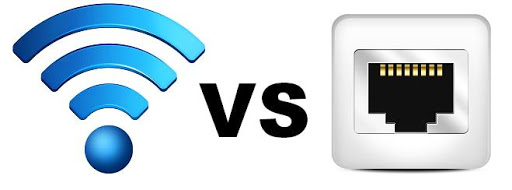WiFi vs Wired
What’s better, wireless or wired, when it comes to internet connections? Most people would instinctively say “WiFi”. Wireless does have many advantages, and in today’s connected culture it’s fairly ubiquitous. But is it truly better? Let’s find out!

WiFi (Wireless)
Let’s face it, WiFi is pretty awesome. The convenience of wireless connectivity is pretty hard to top. You can stream video & audio, play games, and check email from your laptop, tablet or smartphone anywhere within the range of a wireless access point.
WiFi has gotten faster. The IEEE 802.11ac standard maxes-out at theoretical speeds of 3200 Mbps; the IEEE 802.11n manages a less exciting 150 Mbps.
The biggest pro for WiFi is it’s convenient “anywhere” access. Anywhere there is a signal that is. Interference can make it hard to get and stay on a wireless network. As more devices come online due to the ever growing Internet of Things (IoT), this may even become more of a challenge in the near future. The atmosphere can cause issues, and WiFi often produces inconsistent performance. You’ll observe sporadic signaling when you move from one place to another in your home. This issue can be minimized by placing your router in an optimum position in your home or office, but it’s still challenging to achieve the same stable performance of Ethernet connections.
WiFi is great for mobile phones, tablets, laptops and even in some cases desktop computers. On the other hand, it’s an open network so its data isn’t safe. When transmitting sensitive data, be sure to use WiFi networks where the data is encrypted is secured. The most secure encryption method is the WPA2-PSK, while WEP is not very secure. Free public WiFi is often the least secure.
Pros:
Easy to add more devices
More mobility with devices
Cheaper to set up since only 1 network cable is needed to go to the wireless router, mobile devices already have wireless cards built in.
Cons:
Slower and higher latency
Much less stable than wired connections.
Less secure since signal could be intercepted.
Ethernet (Wired – Cat5/Cat6)
Though WiFi has greatly improved in speed and data capability, substantial delivery is still in the future. Ethernet can give you both right now, and not just for computers.
Ethernet has gotten even faster. The current IEEE 802.3bz theoretical standards are 5Gbps for Cat5 and 10Gbps on a Cat6 cable. Standard network cards and equipment deliver speeds of up to 1Gbps. Most competitive gamers will choose a wired connection over wireless everytime. Latency is the delay with which traffic travels from a device to its destination. Also referred to as a ping in the online gaming world, latency is vital when playing games. Reaction time must be quick, and the same goes in the IoT data world.
Lastly, WiFi is inherently vulnerable to various forms of “attack”,such as where the victim connects to an open network which was created by the attacker, who then spies on the user’s traffic and steals their data. These attacks are more difficult to carry out through an Ethernet network, as someone would need physical access to do so. For these reasons, cable connections are more secure than wireless, meaning, they offer a lower risk of incidents if you do not utilize the various security measures available.
Pros:
Much faster.
Much more stable than a wireless connection.
More secure since data is traveling through wires rather than open air.
Cons:
Cables need to be run to devices and added when you add devices.
You are stuck in cable range with a wired network.
More expensive since cable has to be run, and it may require a professional to run the cables well and make them look good in a home.
Homes with desktop computers and devices that depend on speed and low latency should have at least some wired connections. Typically in bedrooms or home offices where desktops would be and also in entertainment areas where home theater devices or game consoles would go.
For homes that depend on the mobility of laptops, tablets and cell phones, we recommend using the newest mesh wireless systems to provide good signal throughout the home. Also, plan on upgrading your wireless networking equipment every 2-5 years since older equipment becomes slower and less reliable.
The ideal option would obviously be to have the wired backbone for gaming computers, game consoles and devices looking to stream in ultra-high-definition resolutions as well as a good wireless system that is well maintained.
If you have questions about WiFi or Ethernet, don’t hesitate to call and talk to one of our experts. We have a solution that will fit your needs!
Geek Easy Computers – Making Technology Easier!

Adonis Pointer is a photographer, a collector of vintage razors, and a certified technology geek! Adonis has been involved in computer technology since well, a LONG time! He has been involved in nearly every aspect of the industry from sales to repair to training to consulting. As the Social Media Manager he writes the majority of the posts on the Geek Easy Computers blog.